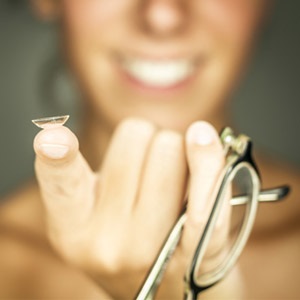
Seven ways to avoid contact lens problems:
- Meticulously follow the cleaning instructions for your lenses to avoid eye infections. Wash your hands before handling your lenses and keep the storage container clean. Never use tap water for storage.
- Do not wear longer than necessary due to risk of infection. Never sleep with daily wear lenses in your eyes.
- Always have a pair of glasses as a backup.
- Always carry a lens storage container filled with fresh contact lens solution and a single dose vial of lubricant eye drops with you in case of an emergency.
- Replace contact lenses at least once a year. Ignoring this simple principle risks the development of allergies. This may exclude you from contact lens wear for the rest of your life.
- Always insert your contact lenses before applying eye make-up to avoid getting makeup on the lenses. Do not apply makeup to the edge of the eyelid behind the eyelashes. Replace your makeup supply every 3-6 months to reduce the risk of infection.
- Visit your eye care professional at least once a year.
Tackle contact lens induced problems like this:
- Remove and disinfect the lens immediately if you notice any redness or discomfort such as burning or scratching. If these symptoms persist for longer than a few hours after removing the lens, contact your eye care professional. If they disappear completely, reinsert the lens after a few hours. If the symptoms reappear, again remove and disinfect the lens and contact your eye care professional.
- In the event of a yellow discharge, eyelid adhesion on waking in the morning or severe light sensitivity, remove and disinfect your lenses and see your eye care professional as a matter of urgency.
- If you have blurred vision: remove the lens and reinsert it, carefully checking that it is the right way round. If the problem persists, contact your eye care professional.
UV light and sunglasses
Excessive exposure to sunlight - especially to certain types of UV light - can be harmful, and is associated with skin damage and cancer. UV light is popularly blamed for causing many eye problems such as pterygia, corneal problems, cataracts, and age related macular degeneration, although it has not been conclusively established that normal exposure of the eyes to sunlight causes any of these conditions.
Which sunglasses should I buy?
Watch out for:
- Distortion - Check the lenses for distortion by looking at a linear pattern, such as floor tiles. If the lines stay straight when you move your head up and down, and from side-to-side, then the amount of distortion is acceptable.
- UV filter. - It is probably sensible to buy sunglasses with a UV A and B filter.
- Polarising filter. - This improves both your vision and comfort as it cuts out glare. It is available with a UV filter.
- Cost. - Label and style have no bearing on the health of your eyes. A cheaper pair usually has no disadvantages as long as you have comfortable vision.
Useful resources:
South African Optometric Association
Tel: 011 805 4517
South African National Council for the Blind
Tel: 012 452 3811
Retina South Africa
Tel: 011 622 4904




 Publications
Publications
 Partners
Partners















